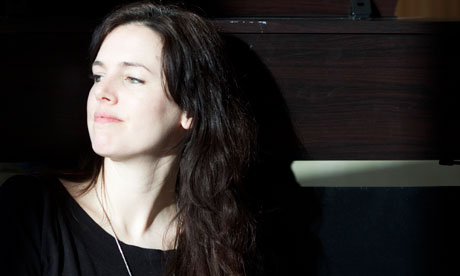This article recently appeared in the Guardian UK.
You may read the article in it's original version here
http://www.guardian.co.uk/commentisfree/2012/feb/08/why-so-few-female-composers

You may read the article in it's original version here
http://www.guardian.co.uk/commentisfree/2012/feb/08/why-so-few-female-composers
Why there are so few female composers
Women who write music are still far outnumbered by their male peers. We need to address this inequality. Here's how

Classical composer Anna Meredith. Photograph: David Levene
I hate the old adage that creative work from women and men comes
from a different place; you know, that lasses are writing music
inspired only by the sea/Japanese court love poetry/constellations
(delete as appropriate) whereas men only write forward-thrusting,
rhythmic, dynamic scores. In the same way that Kathryn Bigelow can
direct a movie about sweaty men blowing each other up in Iraq, women can
write driving, funky bombasts (see Anna Meredith and Tansy Davies).
Orlando Gough wrote a one-woman opera based in a domestic setting, and
I've performed plenty of beautiful, melodic delicacies composed by
chaps. Everyone is different. Everyone writes different sorts of music.
Enough said.
But is there a gender gap in the music industry? Well yes. The facts are clear: 14% of the PRS for Music Foundation's (the Performing Rights Society of composers, songwriters and music publishers) members are female. In the BBC Proms 2011, three out of 11 new commissions were from female composers (with a further one in 10 of other significant premieres). The British Composer Awards did have a bumper season in 2010, with half the number of winners being female, though it seems this might have been an anomaly: in 2011, there were six female composers out of 43 nominated.
I don't believe there's a cabal of grunting old men in darkened, smoky rooms putting big crosses over scores submitted by ladies. I've never felt discriminated against in the slightest, so rest assured I am not setting fire to my piano to rage against the dying of the light. It's simply true to say that there are more professional male music creators than female out there. For some reason, it's taking a lot longer than in literature and the visual arts to reach equilibrium. It was deemed (just about) acceptable by the 19th century for female writers to be published, yet it's only in the last couple of decades that female composers have really emerged, blinking, out of their garrets and into publishing houses and record label offices; so, without a little helping hand, there might be a long way to go yet.
So wherefore the imbalance? Look a little further down the chain, and you'll consistently see more eager male teenage composers than female; there's a real dropping-off in confidence in teenage girls to compose. At Junior Trinity – a Saturday school for talented young musicians where I teach – there are more female students than male, but only a third of students studying composition are girls.
At an all-girls' school workshop I ran recently, the music teacher said it was brilliant for the students to see, with their own eyes, a real live professional female composer. At GCSE and A-level, the classical composers studied in set works are almost exclusively male. And white. Oh, and dead. It's glaringly obvious: if girls are presented with examples of successful female creators in all genres, they might view composition as a viable profession for themselves.
Positive prejudice goes some way to helping this. Last year, the PRS for Music Foundation, looking at their alarming statistics, decided to do something about it, funding 28 projects through their Women Make Music scheme (including me, with a project on British birds in folklore. ). And today, UK Music launched their Equality & Diversity charter, encouraging organisations, businesses and individuals to commit to two or more actions to help improve equality and diversity in 2012.
No doubt some people would say this is political correctness gone mad. They're wrong. These are great initiatives – not just for women, of course, but – in UK Music's case – for people of different ethnic backgrounds and for people with disabilities.
We need, however, to address the inequality at the nub: those writing the curriculum, the National Music Plan, and teachers at all levels should make an effort to use examples of music by women in the classroom; to promote composition as a living, breathing, utterly unisex profession.
There would be no greater achievement for me and my female peers to see that we've inspired more girls to follow a similar path – but it's down to educators, programmers and organisations to help.
• Follow Comment is Free on Twitter @commentisfree
But is there a gender gap in the music industry? Well yes. The facts are clear: 14% of the PRS for Music Foundation's (the Performing Rights Society of composers, songwriters and music publishers) members are female. In the BBC Proms 2011, three out of 11 new commissions were from female composers (with a further one in 10 of other significant premieres). The British Composer Awards did have a bumper season in 2010, with half the number of winners being female, though it seems this might have been an anomaly: in 2011, there were six female composers out of 43 nominated.
I don't believe there's a cabal of grunting old men in darkened, smoky rooms putting big crosses over scores submitted by ladies. I've never felt discriminated against in the slightest, so rest assured I am not setting fire to my piano to rage against the dying of the light. It's simply true to say that there are more professional male music creators than female out there. For some reason, it's taking a lot longer than in literature and the visual arts to reach equilibrium. It was deemed (just about) acceptable by the 19th century for female writers to be published, yet it's only in the last couple of decades that female composers have really emerged, blinking, out of their garrets and into publishing houses and record label offices; so, without a little helping hand, there might be a long way to go yet.
So wherefore the imbalance? Look a little further down the chain, and you'll consistently see more eager male teenage composers than female; there's a real dropping-off in confidence in teenage girls to compose. At Junior Trinity – a Saturday school for talented young musicians where I teach – there are more female students than male, but only a third of students studying composition are girls.
At an all-girls' school workshop I ran recently, the music teacher said it was brilliant for the students to see, with their own eyes, a real live professional female composer. At GCSE and A-level, the classical composers studied in set works are almost exclusively male. And white. Oh, and dead. It's glaringly obvious: if girls are presented with examples of successful female creators in all genres, they might view composition as a viable profession for themselves.
Positive prejudice goes some way to helping this. Last year, the PRS for Music Foundation, looking at their alarming statistics, decided to do something about it, funding 28 projects through their Women Make Music scheme (including me, with a project on British birds in folklore. ). And today, UK Music launched their Equality & Diversity charter, encouraging organisations, businesses and individuals to commit to two or more actions to help improve equality and diversity in 2012.
No doubt some people would say this is political correctness gone mad. They're wrong. These are great initiatives – not just for women, of course, but – in UK Music's case – for people of different ethnic backgrounds and for people with disabilities.
We need, however, to address the inequality at the nub: those writing the curriculum, the National Music Plan, and teachers at all levels should make an effort to use examples of music by women in the classroom; to promote composition as a living, breathing, utterly unisex profession.
There would be no greater achievement for me and my female peers to see that we've inspired more girls to follow a similar path – but it's down to educators, programmers and organisations to help.
• Follow Comment is Free on Twitter @commentisfree

No comments:
Post a Comment